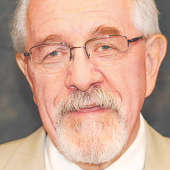- Christmas shopping is done, presents wrapped, strings attached? (12/14/16)
- Cecil is dead and human lives are threatened every day (8/12/15)
- As state flags go, Nebraska's ranks 50th (7/8/15)
- When everything looks like a nail (4/29/15)
- Who remembers to coal slurry pipeline debate? (3/11/15)
- More revelations in Department of Corrections mess (12/17/14)
- The Legislature becomes more Republican (11/19/14)
Opinion
Lawmakers tackle biennial budget task
Wednesday, January 16, 2013
There's a lot on the table as the 103rd Nebraska Legislature -- First Session -- begins with 11 new senators and 38 "seasoned" veterans (some of them with two years' experience and a large number of lame ducks in their last two years) on board.
On top of everything else, it's a budget year and the lame duck governor is expected to wield a heavy hammer to make sure that his legacy as a thrifty guy is emblazoned in stone at the end of the session.
Somewhere between the governor's wishes and three rounds of voting by the full Legislature is a public hearing process and long hours of debate by the nine-member Appropriations Committee. The committee has a specific schedule for completing its work and the Legislature has to have the budget passed by a specific date during the 90-day session.
Governor Dave Heineman has floated a few ideas from his budget wish list. A two-year tuition freeze at the state colleges and the University of Nebraska is one idea aimed at shoring up enrollment figures, making college more affordable and costing the state about $47 million in increased higher education funding.
The Republican Governor who is in his last two years as the chief executive is also toying with the idea of no or "narrowly collected" individual income tax. There are currently nine states that have no or "narrowly collected" income tax, including neighbors South Dakota and Wyoming. Heineman says he thinks the move would make Nebraska more competitive for job creation.
While the Appropriations Committee works to decide who gets the money, the Revenue Committee will be looking for ways to bring in the necessary money to make the Heineman wishes come true. For more than 40 years, Nebraska has operated under the rule that state government can spend money from the income tax and sales tax while local governments rely on property taxes.
Current statistics indicate that Nebraska brought in $1.8 billion in individual income taxes in Fiscal 2011-2012 with another $2.1 billion projected by 2014-2015. State Tax Commissioner Doug Ewald says that's the single largest source of revenue for the state's general fund. To eliminate it, the state would need to replace it. Such a move calls for reasoned debate, and that could be a tall order in a 90-day session.
Of course, there's also this to be considered: The state's Medicaid reimbursement has been cut by $44 million; state aid to schools is also expected to increase; as well as money for mental health and disabilities and prisons and the $47 million increase for higher education.
University of Nebraska President J.B. Milliken says the proposal would save the typical student about $1,000 over two years. Nebraska State College System Chancellor, Stan Carpenter, says it would save his student body more than $2 million and allow students to graduate earlier and with less debt.
Of course, there's the little matter of a projected $200 million budget shortfall that has to be addressed as well since Nebraska has a balanced budget requirement.
On the fiscal side alone, this promises to be a very interesting legislative session.

